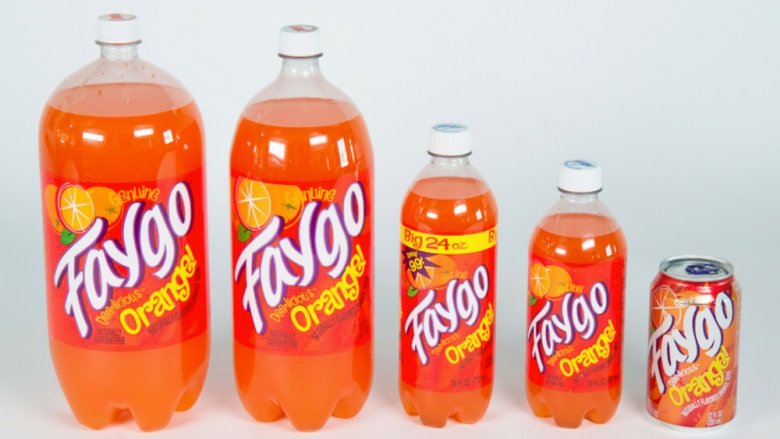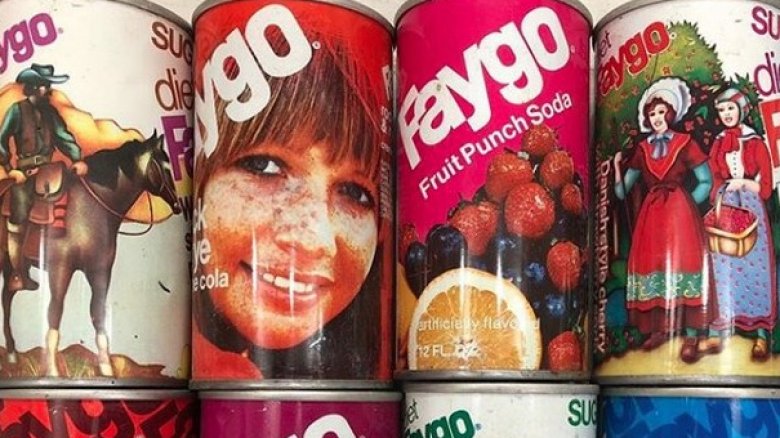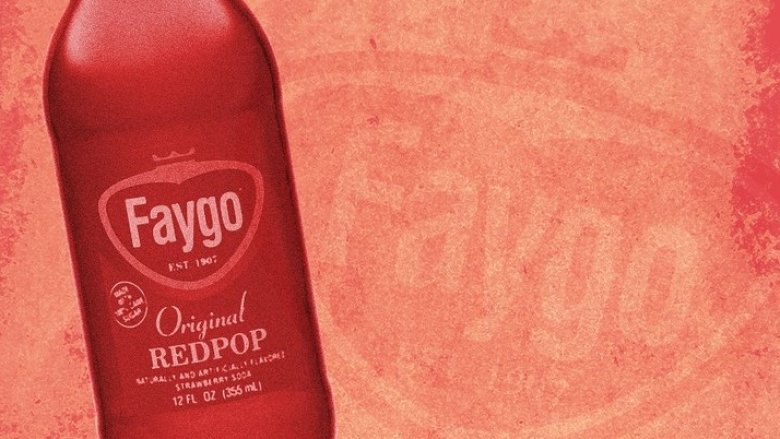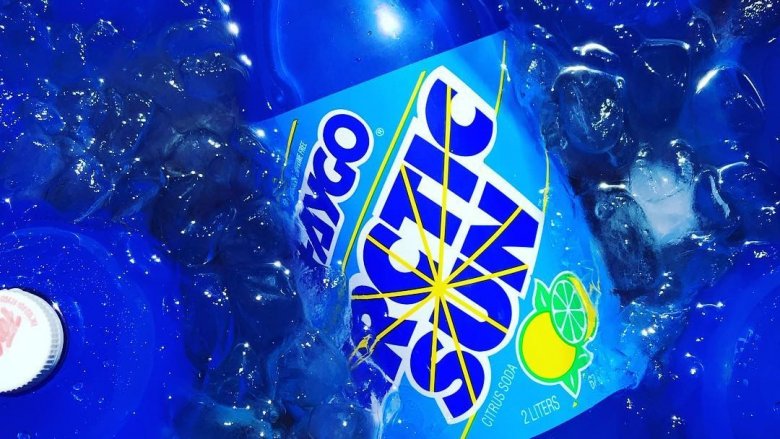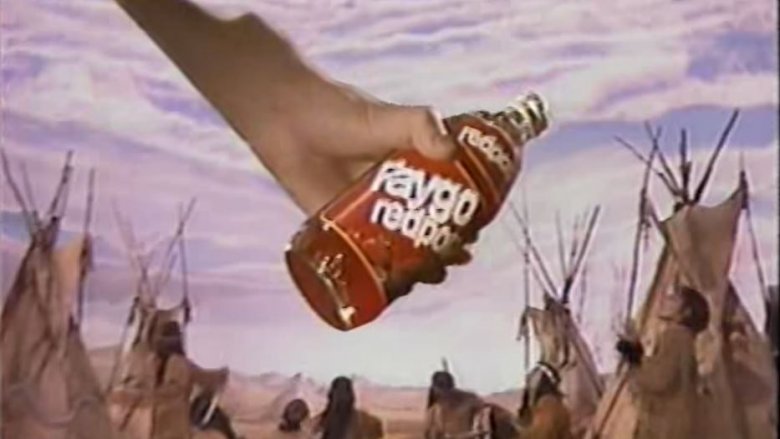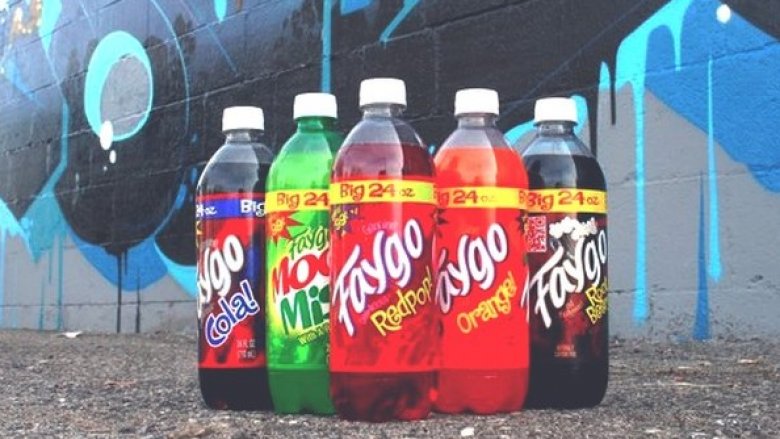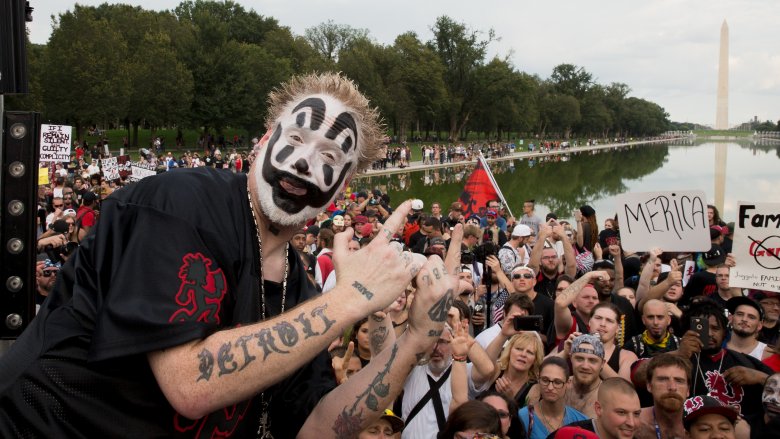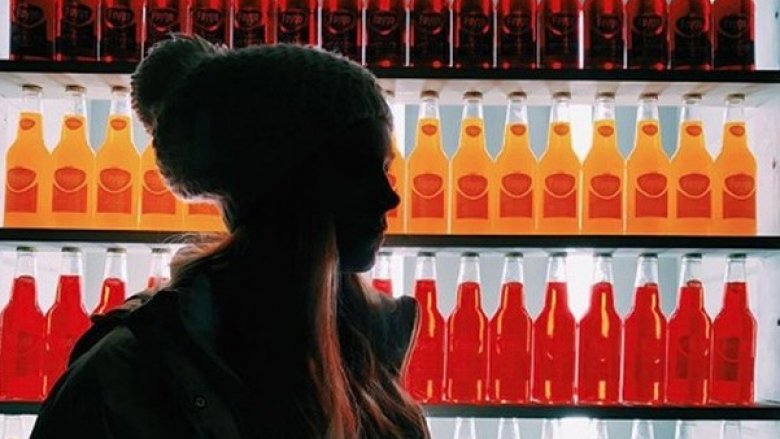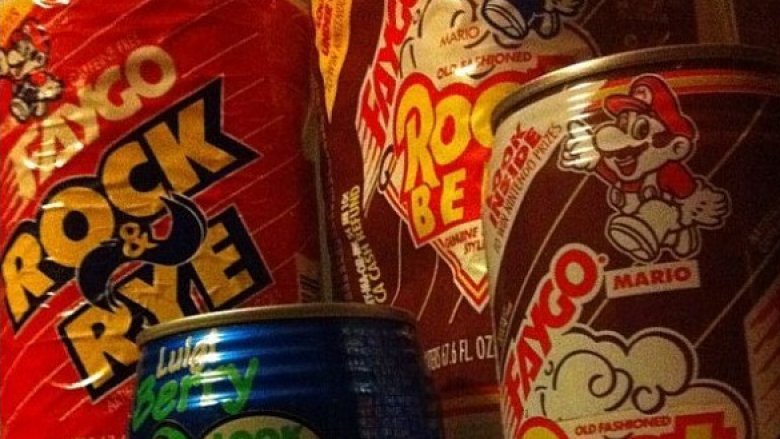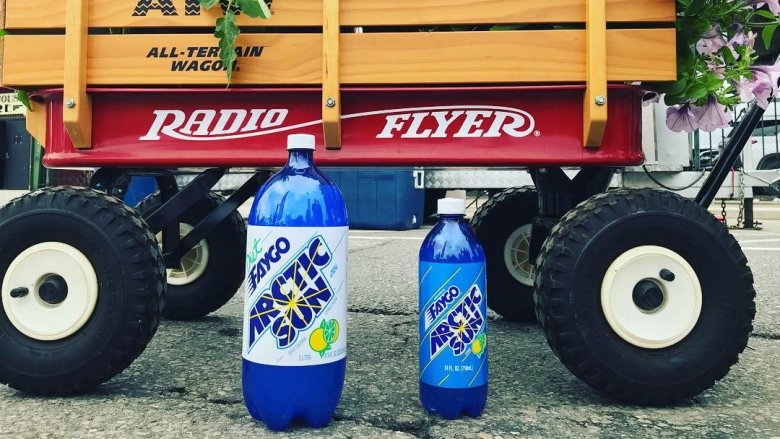The Untold Truth Of Faygo
No one has ever cracked open a Faygo because they're in need of sustenance — people crack open a Faygo because it's fun. Sick of the same, boring old colas and lemon lime? Heck, even ginger ale can get old eventually, and that's where Faygo comes in.
There's no boring here, with flavors like Rock N' Rye, Candy Apple, 60/40, Gold, Jazzin' Blues Berry, and Cotton Candy. And Moon Mist... what even is that? It's definitely not boring, that's what.
For a long time, Faygo had been something of a regional specialty. Founded in Detroit, it was a favorite of people across the Midwest. It wasn't widely known outside of the area, until a strange thing happened and it got a massive boost in popularity thanks to the Insane Clown Posse. Faygo became something of a trademark endorsement for them, and if you've ever wondered just how Faygo feels about that (and some other things)... let's find out.
It has roots in a bakery
Faygo might seem like they're the trendy new kid on the block, but the company was actually formed in the early 20th century. According to the Detroit Historical Society, brothers Ben and Perry Feigenson had just immigrated to the US from Russia when they started their bottling business in 1907. Originally, the Feigenson Brothers Bottling Works bottled soda water, mineral water, and beer, but the brothers tapped into their background to create something entirely awesome.
The brothers were also experienced bakers, and stumbled on the idea of infusing their bottled waters with the flavors of their most popular types of frosting. The first were grape, strawberry, and fruit punch, and those original bottles were sold off the back of a horse-drawn wagon. Freshness was a key selling point, too, and even now, they remain a home-grown sort of company. After they changed their name to Faygo in 1921 (to make it easier to fit on the bottles), they moved their facilities to a Gratiot Avenue location in Detroit, where they remain.
It's pop, not soda
Do you call it "pop" or "soda"? Whichever term you use, you probably feel very, very strongly about it. Fans of Faygo know they're firmly on the side of calling it "pop" — so much so that they officially call their strawberry flavor Redpop.
The Detroit Sign Factory says the Feigenson brothers' creation was given the nickname "pop" because of the sound the bottles made when they were opened, and even though that definitely served to help popularize the term, they didn't invent it.
The Online Etymology Dictionary says "pop" as a term for flavored, carbonated beverages dates back to 1812, when it was first used in a letter to describe "A new manufactory of a nectar, between soda-water and ginger-beer...". So sorry, Faygo, you didn't come up with the term, but you did make it popular — and you helped spur on one of the English language's great debates.
They revolutionized the industry
In 2007, The Detroit News looked at not just the history of Faygo, but the impact they've had on the industry. At the time, Faygo products were sold in most states east of the mighty Mississippi, but the innovations that happened at their plants changed the industry from their relatively small distribution all the way up to giants like Coca-Cola and Pepsi.
The first thing they introduced to the industry was the twist-off cap, now used by pretty much every large soda (or pop) company. The other was a bit more complicated, and took some heavy lifting from Faygo's chemists.
Until the 1950s, Faygo had a limited shelf life. No one wants to see their product wasted, so Faygo turned to a group of chemists to find out what was happening and what could be done about it. They found the water contained chemicals that were harmless, but cut down on how long the CO2 lasted in the bottles. A little bit of hard work later, and Faygo chemists created the water filtration process that gives carbonated beverages their long shelf life today.
They were an advertising juggernaut
Celebrity endorsements are nothing new, and you can tell a lot about a product based on who they get to advertise. Pepsi had Joan Crawford guiding their business decisions, after all, and that just says "class."
Today, Faygo is most well-known for their association with the Insane Clown Posse, but it's important to note that's absolutely not a formal arrangement — or an arrangement Faygo condones. Their actual advertising is even more impressive, and there's a surprising group of high-profile people who have done ads for them over the years.
Joan Rivers was one of their most prolific spokespeople, doing a ton of commercials for them throughout the 'fa80s. Jamie Farr of M*A*S*H fame did ads for them in the 1970s, and they even had comedy legends Laurel and Hardy singing their praises in television ads during the '70s. And even earlier than that, the Detroit Kid Show says Faygo had one of the most popular mascots of '50s television: the Faygo Kid, a cowboy character always on the lookout for Faygo.
They're not thrilled with the ICP endorsement
To say that the Insane Clown Posse is a little outside of the mainstream is an understatement, so how does Faygo feel about being so connected to a group who gives an endorsement they didn't want, and who might have such a strong connotation attached to them that they might turn others off from the product? After all, Faygo is such an ingrained part of ICP's culture that they include the brand in many of their lyrics and spray fans with the drink from the stage — that's called a "Faygo Shower."
The New York Times looked at how Faygo felt about it. Matthew Rosenthal, head of Faygo's marketing, was polite but non committal when asked how they felt about this unsolicited endorsement. Rosenthal said, "We wish them the best," but also noted that just based on their lyrics alone, they're not the sort of family-friendly bunch Faygo really wants representing them. It's not surprising, either: Faygo has always marketed itself as the stuff of childhood afternoons in the summertime, not adults in clown makeup who inspire such rabid fans that law enforcement agencies label them a gang — even though they refer to themselves as "Juggalos".
It's a strange association indeed, and one that makes Faygo part of the longest-running, unsolicited celebrity endorsements in advertising.
Faygo has been front and center in ICP-related lawsuits
In January 2018, the Tampa Bay Times reported one of ICP's fans was suing the venue Jannus Live. Plaintiff Sarah Hastings was invited onstage at an ICP show, but once there, she slipped and fell off. Hastings blamed Faygo, saying the floor was so slippery it caused her fall. (Neither ICP nor Faygo were named in the suit.)
ICP was, however, named in a 2015 lawsuit filed by a woman who claimed she was hit by a 2-liter bottle of Faygo thrown from the stage. No one seemed to have learned from that lawsuit — another, similar one was filed against them in 2018. According to WDTN News, the suit claimed Andrea Walker was hit in the chest with an unopened 2-liter of Faygo. The impact resulted in her passing out, and the incident ended with her needing stitches and a cast on her arm.
Some have seen the dangers in throwing Faygo, and in 2015 a San Diego concert venue banned Faygo from an ICP show. ICP cancelled the show rather than go on without it, says NME, and their apology is anything but family-friendly.
Faygo vs. Fascism
It's not all bad news when it comes to Faygo and ICP, and Tablet connected the dots between Faygo and anti-Fascism in a fascinating way.
In 2017, ICP and their Juggalos stepped into the fray in the war between America's left and the alt-right. They all got together to march on DC on the same day as a rally for Donald Trump, and they made it clear which side they were on. The band — already known for their anti-racism stance and burning the Confederate flag — got a bit of grudging respect.
And Tablet also points out that Faygo was founded by Jewish immigrants, and the fact that they're one of the traditions that bind all Juggalos, Jugalettes, and ICP themselves, that means ICP's anti-Fascism protests have been driven, in part, by a Jewish business. They also point out that sets Faygo up to be the antithesis of Fanta, a product created in Nazi Germany. Food for thought.
It doesn't have as much sugar as you think
Anyone who's ever had Faygo knows it's super-sweet, but strangely, it doesn't have nearly as much sugar in it as you might expect. The activist group Sugary Drink Facts has compiled a report of the sugar content in all different types of sodas (and pop), and the results are surprising.
We'll start at the bottom, for comparison's sake. Faygo's Cream Soda and Moon Mist both come in on the low end, with 24 grams. The famous Redpop? That has 25 grams.
There's too many to list (and sugar content varies), but the most sugar-laden Faygo is Orange, with 28 grams of sugar.
Now, for the other end of the spectrum. Coming in at the top of the list are Jones and many of their flavors, including Root Beer, Lemonade, and Cream. Each one of those contains 43 grams of sugar, and their Cola has even more than that: 48 grams. So, while Faygo might be known as being super-sweet, it's nowhere near the top of the naughty list.
A long-hidden Easter egg
There's another weird cross-over that's happened with Faygo, and that's their connection with Super Mario Brothers. In the 1990s, Faygo licensed some of Nintendo's most famous characters (sorry, Link) to appear on their bottles. But, in 2017, Faygo posted a bit of nostalgia on their Instagram that suggested something else had been involved, too.
Their throwback Instagram post was captioned: "What would you say if we told you there was a Faygo Easter egg in the game that no one has found to this day?"
What? That would be an impressively hidden Easter egg, because gamers spend hours and hours combing through every bit of every game looking for just these sorts of things. Faygo hasn't said anything more about it, but Redditors speculate that based on the era of the photo, the Easter egg could be hidden in Mario's Time Machine, Mario is Missing, or Super Mario All-Stars. Time to dust off those vintage consoles, Faygo fans!
They were sued by the founder's grandson
In 2014, Faygo got some bad press when Hugh Matthew Rosenthal, grandson of Faygo's founder, sued the company for age discrimination. According to USA Today, Rosenthal started in the syrup room, drove delivery trucks, and spent most of his 68 years promoting and helping to grow the business. He had worked his way up to being a senior advertising executive in the years before he was fired, and to add insult to injury, his job duties were re-posted and he was replaced by someone half his age.
Rosenthal said it was a lawsuit he never, ever thought he would file, and it didn't go his way. The official verdict found that Faygo hadn't terminated him based on his age, but on his performance. The court ruled, "Rosenthal's efforts to establish that this legitimate explanation was just a pretext for a decision actually motivated by an unlawful bias against age simply fall flat."
Faygo was in the clear for this one.
